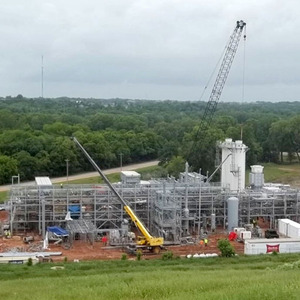Velocys discusses future plans in financial report




Velocys plc
October 5, 2017
BY Erin Krueger
Velocys plc has released financial results for the first half of 2017, providing an overview of key milestones and a discussion of its new strategy as a renewable fuels company that aims to produce jet fuel and diesel fuel.
During the first half of the year, Envia Energy’s Oklahoma City plant, which serves as a reference plant for Velocys’ gas-to-liquids technology, produced its first finished, saleable products. Reactors and catalyst at the plant performed in line with performance requirements at commercial scale. According to Velocys, the Envia plant is expected to reach a key capacity milestone in October.
Also during the first six months of 2017, Velocys unveiled a new strategy as a renewable fuels company focused on jet and diesel fuels. According to the company, it is making progress towards the development of its first biorefinery in the U.S. Developments include partnership formed with Morimatsu (Jiangsu) Heavy Industry and ThermoChem Recovery International Inc., the selection of IHI E&C International Corp. for a FEL-2 engineering study, an invitation by the USDA to advance to the Phase II application for a loan guarantee of up to $200 million, and the appointment of Sumitomo Mitsui Banking Corp. as the lender of record.
Advertisement
“As Velocys the renewable fuels company, we have made considerable progress in our strategy implementation and subsequent restructuring of the business over the first part of the year,” said David Pummell, CEO of Velocys. “Successive operational milestones have been reached at Envia Oklahoma and we have made steady progress towards developing our first biorefinery in the US. The success of the Velocys Fischer-Tropsch system at Envia validates our technology at a commercial scale, and it will be this system that, we will take forward in our future biorefineries, subject to securing further funds.”
Within the financial report, the company notes that its current focus is on the production of renewable fuels in the U.S. market using woody biomass waste materials as feedstock. However, the company is also remaining open to other opportunities that complement its core strategy. This includes a partnership with British Airways and Suez aimed at developing waste-to-jet fuel plants in the U.K.
Advertisement
The report also indicates that the skid-mounted Fischer-Tropsch of Velocys’ pilot plant has been relocated from Ohio to TRI’s facility in Durham, North Carolina, where it will form part of an integrated gasification/Fischer-Tropsch technology demonstration. According to Velocys, work to combine the two technology platforms to form the integrated demonstration plant is continuing. The demonstration is a requirement for the USDA loan guarantee application process.
Velocys also indicated that the process of selecting sites for its biorefineries is well advanced. The company said it is looking beyond siting its first plant and aims to develop partnerships that will deliver multiple biorefineries with a standard design. Locations in the Southeast region of the U.S. have been identified that could host plants with capacities totaling 100 million gallons. According to Velocys’ it is currently finalizing the contract for placing an option on a preferred first site and expects to name the site later this year.
Velocys reported total revenues for the first half of the year of £200,000 ($262,320). Operating loss was £9.4 million before and £10.1 million after exceptionals. Cash at period end stood at £13.8 million, while cash outflow was £4.9 million.
Related Stories
The U.S. Department of Energy Bioenergy Technologies Office (BETO) announced up to $23 million in funding to support research and development (R&D) of domestic chemicals and fuels from biomass and waste resources.
The U.S. DOE has announced its intent to issue funding to support high-impact research and development (R&D) projects in two priority areas: sustainable propane and renewable chemicals and algal system cultivation and preprocessing.
Sens. Sherrod Brown, D-Ohio, and Pete Ricketts, R-Neb., in August introduced the Renewable Chemicals Act, a bill that aims to create a tax credit to support the production of biobased chemicals.
The Chemical Catalysis for Bioenergy Consortium, a consortium of the U.S. DOE’s Bioenergy Technologies Office, has launched an effort that aims to gather community input on the development of new biomass processing facilities.
USDA on March 8 celebrated the second annual National Biobased Products Day, a celebration to raise public awareness of biobased products, their benefits and their contributions to the U.S. economy and rural communities.
Upcoming Events










